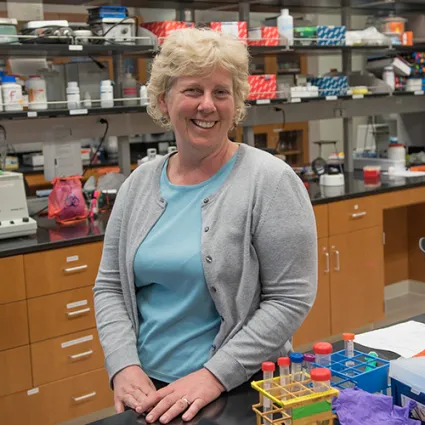Christine White-Ziegler
Professor of Biological Sciences

Biography
The White-Ziegler laboratory uses molecular biology tools to investigate how environmental cues are sensed and used by commensal, uropathogenic, and enteropathogenic Escherichia coli to regulate gene expression. These microbes have evolved elaborate sensory mechanisms to detect environmental changes and use this information to regulate cellular activities. This is particularly evident among bacterial pathogens that use environmental cues to discern between host and non-host environments. Temperature is a cue that changes dramatically as a bacterium enters a host (37˚C) from the external environment (23˚C). Mimicking this transition into a human host, our laboratory has demonstrated that a suite of genes related to adhesion, immune evasion, biofilm formation, and stress responses are rapidly altered by this temperature shift. The White-Ziegler laboratory considers how genes with increased expression at human body temperature (37˚C) relate to adaptation to and colonization of the host while genes more highly expressed at ambient temperature (23˚C) give insight to how microbes acclimate to biomedically relevant external settings. Studies of the cues and proteins that drive transcription of these E. coli genes promotes the broader goal of identifying novel targets for infection prevention or treatment.
Selected Publications
Anastasia Gant Kanegusuku, Isidora N. Stankovic**,Pamela A. Cote-Hammarlof **,Priscilla H. Yong **, Christine A. White-Ziegler. “A Shift to Human Body Temperature (37°C) Rapidly Reprograms Multiple Adaptive Responses in Escherichia coli That Would Facilitate Niche Survival andColonization” J Bacteriol. 2021 Oct 25;203(22):e0036321. doi: 10.1128/JB.00363-21. Epub 2021 Sep 13. PMID: 34516284; PMCID: PMC8544407
White-Ziegler, Christine A., and Talya R. Davis **. "Genome-wide identification of H-NS controlled, temperature regulated genes in Escherichia coli K-12." J Bacteriol. 2009 Feb;191(3):1106–10. Epub 2008 Nov 14.
White-Ziegler, Christine A., Suzin Um**, Natalie Peréz**, Abby L. Berns**, Amy J. Malhowski**, and Sarah Young**. "Low temperature (23°C) increases expression of biofilm-, cold-shock- and RpoS-dependent genes in Escherichia coli K-12." Microbiology. 2008 Jan;154(Pt 1):148–66.
White-Ziegler, Christine A., Amy J. Malhowski**, and Sarah D. Young**. "Human body temperature (37°C) increases the expression of iron, carbohydrate, and amino acid utilization genes in Escherichia coli K-12." Journal of Bacteriology. 2007. Vol. 189(15):5429–40. Epub 2007 May 25.
White-Ziegler, Christine A., Alia M. Black, Stacie H. Eliades**, Sarah Young**, and Kimberly Porter**. "The N-acetyltransferase RimJ responds to environmental stimuli to repress pap fimbrial transcription in Escherichia coli." J Bacteriol. 2002 Aug;184(16):4334–42.
White-Ziegler, Christine A., Anurhada Villapakkam**, Karla Ronaszeki**, and Sarah Young**. "H-NS controls pap and daa fimbrial transcription in response to multiple environmental cues." J Bacteriol. 2000 Nov;182(22):6391-400.
White-Ziegler, Christine A., Melinda L. Angus Hill, Bruce A. Braaten, Marjan W. van der Woude, and David A. Low. "Thermoregulation of Escherichia coli pap transcription: H-NS is a temperature-dependent DNA methylation blocking factor." Mol Microbiol. 1998 Jun;28(6):1121–37.
**Smith College student author